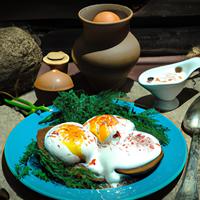
1 serving (50 grams) contains 70 calories, 6.0 grams of protein, 5.0 grams of fat, and 0.5 grams of carbohydrates.

Log this food in SnapCalorie

Nutrition Information
Calories |
333.3 | ||
|---|---|---|---|
% Daily Value* |
|||
| Total Fat | 23.8 g | 30% | |
| Saturated Fat | 7.6 g | 38% | |
| Polyunsaturated Fat | 0 g | ||
| Cholesterol | 881.0 mg | 293% | |
| Sodium | 309.5 mg | 13% | |
| Total Carbohydrates | 2.4 g | 0% | |
| Dietary Fiber | 0 g | 0% | |
| Sugars | 1.0 g | ||
| protein | 28.6 g | 57% | |
| Vitamin D | 190.5 mcg | 952% | |
| Calcium | 119.0 mg | 9% | |
| Iron | 4.3 mg | 23% | |
| Potassium | 285.7 mg | 6% | |
* Percent Daily Values are based on a 2,000 calorie diet. Your daily values may be higher or lower depending on your calorie needs.
Food Attributes
Source of Calories
About Eggs runny
Eggs Runny, often associated with breakfast dishes across various cuisines, typically refers to eggs cooked so that their yolks remain liquid. This preparation is popular in Western and Asian cuisines alike, appearing in meals such as eggs benedict, ramen bowls, or classic toast pairings. Runny eggs are rich in protein, essential vitamins like B12, and minerals such as selenium and phosphorus. They are a great source of choline, important for brain health and cell function. However, consuming eggs with runny yolks carries a slight risk of salmonella if not properly cooked or sourced from reputable suppliers. Pairing runny eggs with nutrient-dense vegetables, whole grains, or lean proteins can enhance their health benefits while balancing cholesterol intake. A versatile ingredient, runny eggs contribute to culinary richness and high-quality nutrition when enjoyed in moderation and prepared safely.



